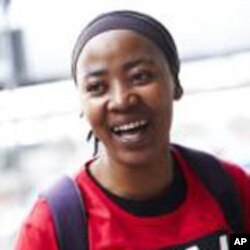Next week, donor nations meet in New York to decide how much money to give the Global Fund to Fight AIDS, Tuberculosis and Malaria. Activists and NGOs say the fund needs at least $20 billion to sustain current programs and provide new grants. However, there are indications donors will contribute a lot less than that in the last funding round.
Vuyiseka Dubula, general secretary of South Africa’s Treatment Action Campaign (TAC), has concerns about donor funding levels.
“Our main concerns are the signs that we see from the G8 countries,” she says, “showing [much] less commitment to universal access. And we measure that by their commitment to increase their expenditure on health and HIV.”
10 million people in need
In 2005, at the G8 summit in Gleneagles, Scotland, leaders pledged to achieve universal access to HIV/AIDS treatment, care and prevention by 2015.
“We’ve been calling on the G8 countries, including the U.S., Germany, the U.K., Italy, Japan and so on, to replenish the Global Fund when the replenishment conference comes up this year,” she says.
Few countries have officially announced their funding amounts prior to next week’s meeting. There are that indications Italy, for example, may pledge a small amount or nothing at all.
“Many countries are now ‘pledge funding’ HIV programs, meaning that there will not be an increase from now up to 2015. And that has an impact on people who are supposed to be getting access to treatment. Because by now we should be at 10 million people who should be on treatment this year. And so far, we have about 7.7 million people who are on treatment,” she says.
Missing out
There has been a growing number of reports in Africa this year that people are being turned away from HIV/AIDS treatment programs due to funding shortfalls.
While South Africa does get money from the Global Fund, most HIV-related programs are funded by the government. It’s a different story for South Africa’s neighbors. Dubula says countries such as Lesotho, Swaziland, Zimbabwe and Congo depend on external funding for most their HIV-related programs. “Obviously,” she says, “they have had to turn people away.”
“If you pull the plug on the Global Fund,” she says, “then those countries will not be able to treat their own people. And many people waiting to be started on treatment will wait forever and die, because the ultimate result of no treatment is death.”
Residents of neighboring countries could go to South Africa in hopes of receiving treatment no longer available at home. “There is no one who lives with HIV who wants to live without their drugs,” she says.
South Africa
Dubula says South Africa has “the biggest HIV program in the world” with over a million people on treatment.
“Our biggest challenge is sustainability of that program as we go forward -- both human resource capacity and financial resource capacity -- to scale up services to meet 80 percent of people who should be getting access to treatment.”
The South Africa government uses “creative” ways to use its money effectively, she says, adding, “To use that money effectively we need an HIV program that is run efficiently, meaning that the money we are spending can save as many lives as possible, rather than spending too much money using the most expensive model of care.”
Still, South Africa would feel the effects of smaller donations to the Global Fund, even though the grants it receives are much smaller than other countries that “depend solely” on the fund.
“It will affect us,’ she says, “It means we won’t reach our target. Many people that we thought we were going to put on treatment will not go on treatment.”




